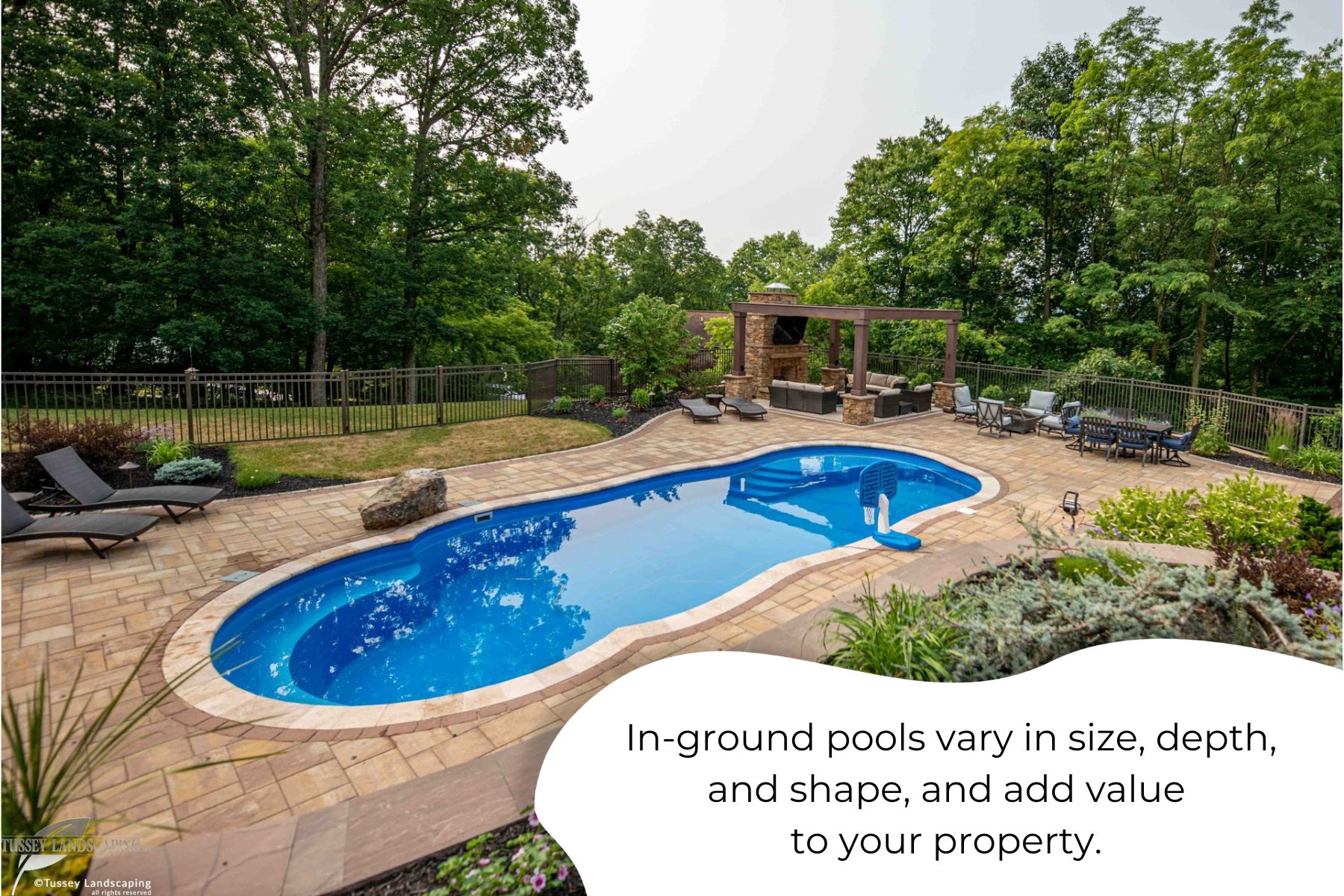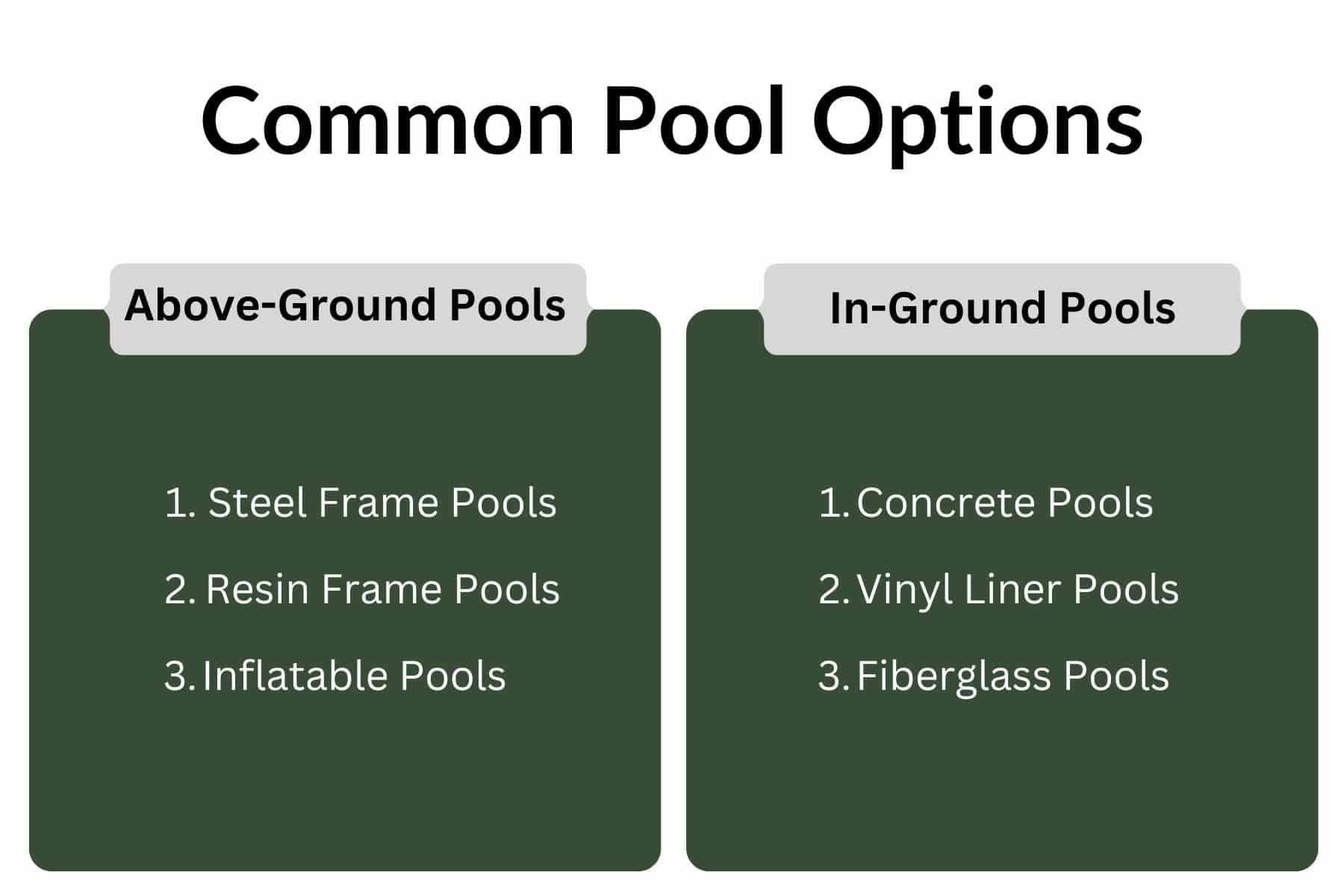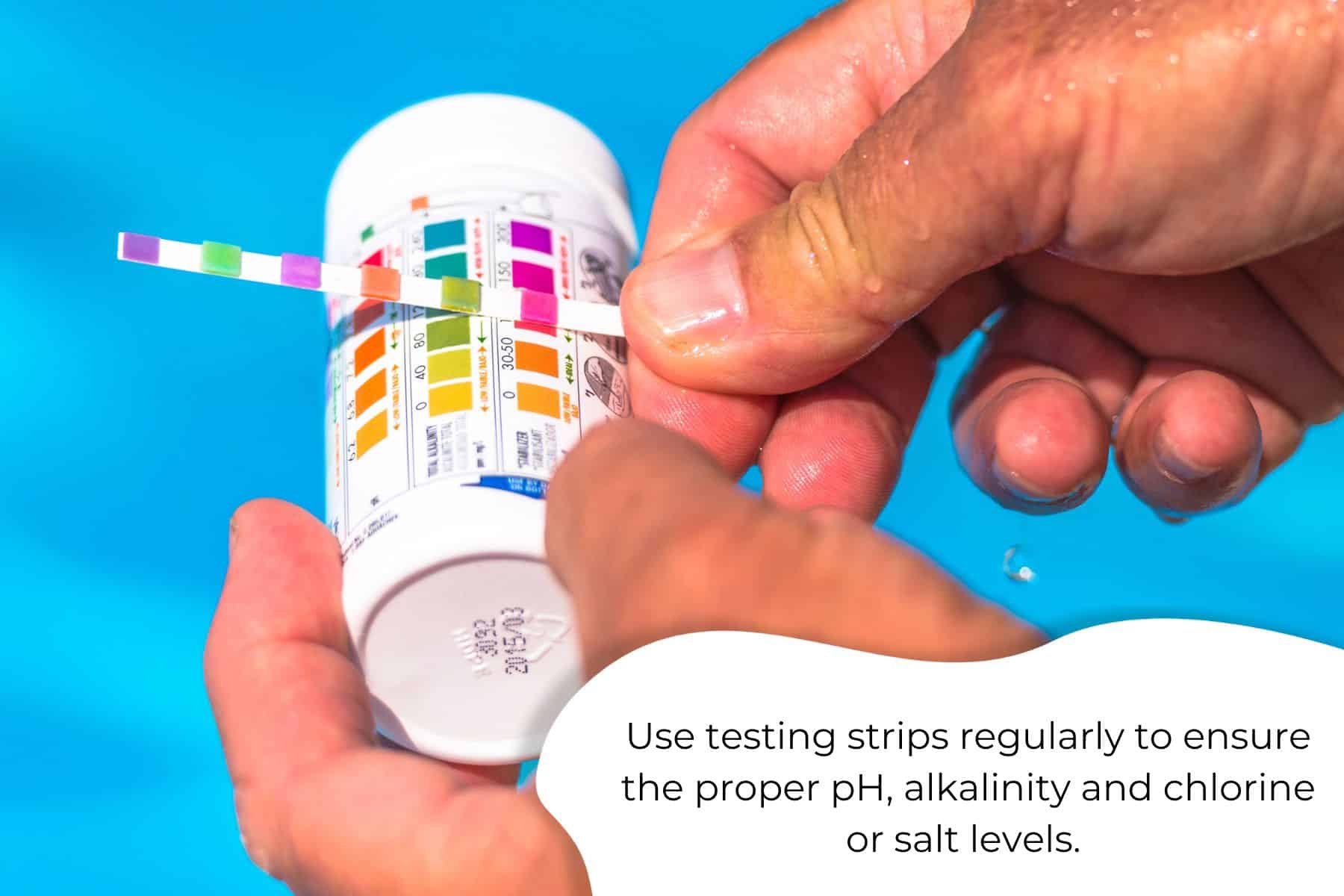It’s a warm summer evening, and when you come home from working in a dim office all day, you wish you could convince your family to enjoy the weather together instead of retreating to their air-conditioned bedrooms.
But between the heat, humidity, and insects, it’s difficult to tempt them outside.
Don’t worry, there’s a solution!
A swimming pool allows you to spend quality family time together while cooling off and unwinding after a long day.
Of course, you probably have questions about the types of pools available, how much maintenance a pool needs, and how to keep your children safe with deep water in your backyard.
At Tussey Landscaping, we install stunning swimming pools in backyards like yours, and we’d love to answer all your questions!
Let’s get started.
Why Buy a Swimming Pool?
A swimming pool is a significant investment, and if you’re considering getting one, your first worry is that it will be more costly and bothersome than it’s worth.
To help you decide if a pool is right for you, let’s look at the top reasons people install swimming pools.
- Pure Enjoyment: There’s no getting around it—swimming pools are fun for children and adults alike. Nothing beats the feeling of jumping into cool water on a hot day. Families with pools report using it almost every hot day of the year.
- Health and Fitness: Swimming is a fantastic way to get exercise while having fun. It provides a full-body workout, improving cardiovascular health, muscle strength, and flexibility without having a harsh impact on your joints.
- Social Reasons: There’s no doubt about it—pools bring people together. Ask anyone with a pool, and they’ll tell you that it draws family and friends over and provides a way for their family to spend time together.
- Increased Property Value: A well-designed pool will boost your home’s value as long as it’s well-maintained. However, if increasing your home’s value is your main concern, a pool has a low return on investment compared to other improvements. Only purchase a pool if it will add value to your life, not just your home!
Types of Swimming Pools
The two basic types of pools are above-ground pools and in-ground pools. Let’s examine these two pool types and some popular pool variations.
Above-ground Pools
Above-ground pools are set up on top of the ground. Their main advantage is that they are inexpensive, easy to install, and can be moved easily and taken with you if you relocate.
On the other hand, above-ground pools don’t look as nice, aren’t as deep, and wear out much faster than in-ground pools.
In-ground Pools
In-ground pools are set into the ground, becoming part of the hardscape and adding a beautiful, tranquil look to your yard.
In-ground pools also last much longer than above-ground pools and vary widely in size, depth, and shape. Unlike above-ground pools, they add to your property value, but they are also much pricier and can’t be taken with you if you move.

Other Pool Types
Between size, shape, materials, and filtration systems, there are many types of pools available. Here are a few popular pools:
- Long, narrow lap pools designed for swimming laps
- Natural pools, which look like ponds and clean the water with natural filtration and plants
- Saltwater pools, which use a saltwater system instead of chlorine for cleaning the water
Plunge pools, which offer a quick way to cool off without taking up much space
Common Swimming Pool Materials
The materials you choose for your swimming pool make a massive difference in its longevity, maintenance, and overall look. Here’s a closer look at some common options:
Above-ground Pool Materials
- Steel Frame Pools: Steel is a durable material that is slightly more budget-friendly than resin. However, since salt corrodes steel, don’t use a saltwater pool system with a steel frame pool.
- Resin Frame Pools: Resin looks like plastic but is much more durable and robust. Since it doesn’t corrode like steel, it can be used with a salt system. Be aware that resin is pricier than steel, and low-quality resin can crack in extremely cold climates.
- Inflatable Pools: These are the most budget-friendly and are great for temporary setups. However, they’re not as durable as other options and are more susceptible to damage.
In-ground Pool Materials
- Concrete Pools: The main advantage of Concrete pools is that concrete is durable and highly customizable. If you have an extremely unique design in mind, concrete may be your best option. However, it cracks easily, requires lots of maintenance, causes pool heat loss, and is not compatible with a salt system.
- Vinyl-Liner Pools: This is the least expensive in-ground pool option, and it can be customized to your desired size and shape. Still, it’s not as durable as other options and also causes heat loss. You will need to replace the liner every 7-10 years.
- Fiberglass Pools: Most experts recommend fiberglass pools, as they are durable, quick to install, hold heat well, and work well with salt systems. Although they are pricier than vinyl-liner pools, you’ll save money on heating and maintenance costs, and they tend to be cheaper than concrete pools. The only downside to fiberglass pools is that your size and shape options are limited because they are pre-cast. However, there is still a huge variety of options available.

Caring for and Maintaining Your Swimming Pool
Pool maintenance can feel overwhelming at first. It takes significant work to keep your pool clean and well-maintained. But once you know what you’re doing, you can keep on top of the tasks with a regular cleaning and maintenance schedule.
The three components of your pool to keep an eye on are:
Basic water, wall, and floor cleanliness
Use a skimmer basket to remove leaves, bugs, and other debris from the pool’s surface. Regularly brush the walls and use a pool vacuum on the floor. Experts recommend cleaning the skimmer twice a week and the walls and floor once a week, but you can use your judgment to determine how often these components need cleaning.
Water chemical levels
Use testing kits regularly to ensure the proper pH, alkalinity, and chlorine or salt levels (depending on your system).
It’s also a good idea to periodically take a sample of your water to a professional water testing service.
Cleanliness of the hidden pool components like the pump and filter
You should clean your filter twice a year and keep the pump running daily to ensure proper circulation.

Pool Safety Considerations
Another concern you may have when considering purchasing a pool is safety. You may have heard alarming stories of children drowning in backyard swimming pools, making you anxious about installing one yourself.
Here are a few ways to ensure that your family stays safe.
Fencing and Barriers
Surround your pool with a fence that’s at least four feet high. For extra safety, install a self-closing and self-latching gate.
Pool Covers
When not in use, cover your pool with a safety cover designed to withstand weight and prevent people from accidentally falling in.
Alarms and Safety Devices
Install alarms on pool gates and underwater alarms that detect motion. Keep lifesaving equipment like life rings and pool noodles accessible.
Supervision, Rules, and Training
With proper training, your children can learn to swim safely and recognize and help another child in danger. Always supervise young children while they swim and establish and enforce basic safety rules.
How Tussey Landscaping Can Help
We hope you’ve enjoyed this basic overview of pools and are now better equipped to make the best pool decision for your backyard.
At Tussey Landscaping, we specialize in bringing your outdoor dreams to life. That includes installing gorgeous swimming pools that help you relax and cool off with family and loved ones during the dog days of summer.
If you’re interested in learning more, feel free to contact us or build out your project using our project planner!
We look forward to working with you.






